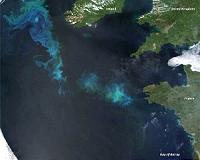 |
Rio De Janeiro (UPI) Jul 27, 2010 Latin American countries face tough choices as drug trafficking, illegal immigration and the threat of attacks on newly found natural resources make new demands on maritime security needs. Top maritime and naval commanders from the region will gather at the second Maritime Surveillance Latin America conference Oct. 18-20 in Miami. The conference is organized by the Institute for Defense and Government Advancement. Key admirals and sea captains from Ecuador, Peru and Chile are among speakers confirmed to attend. Brazil started building up its naval forces as part of a military regeneration plan in 2008. Neighboring countries responded to increased crime on the high seas with extra surveillance and defense preparedness. Recent discoveries of large hydrocarbon reserves further prompted authorities, especially Brazilian government planners, to increase investment in coastal patrols and surveillance. Security briefs on the forthcoming event cited water-borne improvised explosive devices among threats facing law enforcement authorities and security forces along Latin American coastlines. In recent years, maritime interdiction and humanitarian assistance has become a top priority for the Latin American community, IDGA said. "The need for greater communication and cooperation is great," it said. Analysts said increased crime on the high seas and greater movement of people, as well as illegal human traffic, had led to concerns about tightening up security along the coastline. The Maritime Surveillance conference will bring together a variety of international participants -- "stakeholders" -- to discuss what the organizers see as "overarching challenges," IDGA said. These include situational awareness and intelligence, security integration and partnerships, latest capabilities and technologies, information sharing and international law enforcement. The event will also address more specific concerns that continue to plague international ports, such as small vessel threats, waterborne IEDs, drug smuggling and illegal immigration, IDGA said. The conference will feature presentations from several international security experts, including U.S. Navy Rear Adm. Victor G. Guillory, commander, U.S. Naval Forces, U.S. Southern Command; Ecuadorian navy Rear Adm. Aland Molestina Malta; U.S. Air Force retired Maj. Gen. Michael C. Kostelnik, assistant commissioner, Customs and Border Protection; Peruvian navy Capt. Jorge Vargas Guerra; Chilean navy Capt. Jose Luis Sepulveda Mancilla; Guy Thomas, science and technology adviser, Global Maritime Awareness, U.S. Coast Guard. The Institute for Defense and Government Advancement is a non-partisan information-based organization dedicated to the promotion of innovative ideas in public service and defense through live conferences and events. In June the U.N. Office on Drugs and Crime launched a Center of Excellence on Maritime Security in Panama City and opened a Regional Program Office for Central America, Cuba and the Dominican Republic as part of an effort to prevent illicit and counterfeit goods from entering markets through the world's ports. "Most of the world's trade is shipped by containers, which means that containers are also the main delivery system for illicit goods," said UNODC Deputy Executive Director Francis Maertens, adding that "better container security can raise the risks and lower the benefits to organized crime." The UNODC-World Customs Organization Container Control Program helps countries identify suspicious cargo with the creation and use of intelligence and timely information-sharing. Since it started in 2006 in eight countries -- Cape Verde, Costa Rica, Ecuador, Ghana, Pakistan, Panama, Senegal and Turkmenistan -- the program has led to the seizure of 38 tons of cocaine, 770 tons of precursor chemicals and 1,550 tons of illegally logged wood. The Center of Excellence will help diagnose threats in maritime security and serve as a resource of expertise, training, data collection and analysis. It will provide strategic direction and training in search techniques, security, maritime interdiction, human trafficking and the handling of hazardous and toxic cargo. As a new UNODC operational hub, the center will allow the organization to provide more effective advisory services to countries in the region. Drugs flowing from the Andean countries to North America is a key concern, UNODC officials said. "Seventy percent of crimes in Central America are directly linked to drug trafficking," said Panama's Foreign Affairs Minister Juan Carlos Varela. "This reinforced focus on maritime security will help the governments in the region to tackle the common threat of organized crime."
Share This Article With Planet Earth
Related Links Water News - Science, Technology and Politics
 Findings Overturn Old Theory Of Phytoplankton Growth
Findings Overturn Old Theory Of Phytoplankton GrowthCorvallis OR (SPX) Jul 20, 2010 A new study concludes that an old, fundamental and widely accepted theory of how and why phytoplankton bloom in the oceans is incorrect. The findings challenge more than 50 years of conventional wisdom about the growth of phytoplankton, which are the ultimate basis for almost all ocean life and major fisheries. And they also raise concerns that global warming, rather than stimulating ocean ... read more |
|
| The content herein, unless otherwise known to be public domain, are Copyright 1995-2010 - SpaceDaily. AFP and UPI Wire Stories are copyright Agence France-Presse and United Press International. ESA Portal Reports are copyright European Space Agency. All NASA sourced material is public domain. Additional copyrights may apply in whole or part to other bona fide parties. Advertising does not imply endorsement,agreement or approval of any opinions, statements or information provided by SpaceDaily on any Web page published or hosted by SpaceDaily. Privacy Statement |